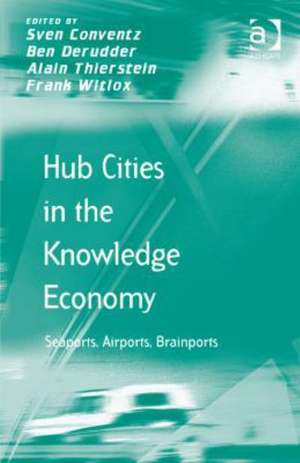Hub Cities in the Knowledge Economy: Seaports, Airports, Brainports
Autor Sven Conventz, Ben Derudder, Alain Thierstein, Frank Witloxen Limba Engleză Hardback – 28 ian 2014
| Toate formatele și edițiile | Preț | Express |
|---|---|---|
| Paperback (1) | 469.34 lei 6-8 săpt. | |
| Taylor & Francis – 26 aug 2016 | 469.34 lei 6-8 săpt. | |
| Hardback (1) | 1062.05 lei 6-8 săpt. | |
| Taylor & Francis – 28 ian 2014 | 1062.05 lei 6-8 săpt. |
Preț: 1062.05 lei
Preț vechi: 1295.19 lei
-18% Nou
Puncte Express: 1593
Preț estimativ în valută:
203.23€ • 212.72$ • 169.15£
203.23€ • 212.72$ • 169.15£
Carte tipărită la comandă
Livrare economică 01-15 aprilie
Preluare comenzi: 021 569.72.76
Specificații
ISBN-13: 9781409445913
ISBN-10: 1409445917
Pagini: 284
Ilustrații: Includes 38 b&w illustrations
Dimensiuni: 156 x 234 x 18 mm
Greutate: 0.66 kg
Ediția:New ed
Editura: Taylor & Francis
Colecția Routledge
Locul publicării:Oxford, United Kingdom
ISBN-10: 1409445917
Pagini: 284
Ilustrații: Includes 38 b&w illustrations
Dimensiuni: 156 x 234 x 18 mm
Greutate: 0.66 kg
Ediția:New ed
Editura: Taylor & Francis
Colecția Routledge
Locul publicării:Oxford, United Kingdom
Notă biografică
Sven Conventz, Munich University of Technology, Germany, Ben Derudder, Ghent University, Belgium; Alain Thierstein, Munich University of Technology, Germany and Frank Witlox, Ghent University, Belgium.
Recenzii
’The remarkable ideas presented in this book offer a valuable window on the connections between mobility networks, knowledge generation and development, for students, academics and policy makers to consider, especially after the economic crisis of 2008 which has affected some countries so deeply. The powerful topic of this work, new and multiple forms of connectivity, guides us through the thought-provoking and clarifying points made about the geography of world cities and world city regions.’ Cándida Gago, Complutense University of Madrid, Spain ’Working across diverse disciplinary fields and geographical scales, the contributors to this rigorous and readable volume show how the infrastructures of transportation and personal mobility combine with local and global networks of knowledge creation and exchange in privileged urban places. The insights and evidence presented are essential for understanding why some city-regions occupy a dominant position in today’s global economy.’ Peter V. Hall, Simon Fraser University, Canada ’For anyone interested in the intersections between infrastructure, connectivity and territorial and networked forms of knowledge production in major city-regions, this is an indispensable collection. It contains a treasure trove of detailed empirical case studies, which significantly advance our understanding of the multiple dimensions of knowledge hubs in the global economy.’ Michael Hoyler, Loughborough University, UK
Cuprins
Introduction Knowledge Hubs, BenDerudder, SvenConventz, AlainThierstein, FrankWitlox; Part I PART I; Chapter 1 Knowledge Flows and Physical Connectivity in the Global Economy, BenDerudder, Elien VanDe Vijver, FrankWitlox; Chapter 2 Knowledge Hubs, MichaelBentlage, AlainThierstein, StefanLüthi; Chapter 3 Knowledge Hubs in the Polycentric German Urban System between Concentration Processes and Conurbation Dynamics, AnnaGrowe; Chapter 4 Hub-airports as Cities of Intersections, SvenConventz, AlainThierstein; Chapter 5 European Port Cities, AnneWiese, AlainThierstein; Part II PART II; Chapter 6 Hub Cities in the Evolving Internet, Edward J.Malecki; Chapter 7 Urban and Regional Analysis and the Digital Revolution, EmmanouilTranos, PeterNijkamp; Chapter 8 Mediating the City, OliMould; Part III PART III; Chapter 9 Agglomeration and Knowledge in European Regional Growth, TeodoraDogaru, Frankvan Oort, DarioDiodato, MarkThissen; Chapter 10 Types of Hub Cities and their Effects on Urban Creative Economies, Zachary P.Neal; Chapter 11 Capital Cities as Knowledge Hubs, HeikeMayer, MargaretCowell;
Descriere
The overarching research topic addressed in this book is the complex and multifaceted interaction between infrastructural accessibility/connectivity of city-regions on the one hand and knowledge generation in these city-regions on the other hand. To this end, the book brings together chapters analysing how infrastructural accessibility is related to changing patterns of business location of knowledge-intensive industries in city-regions. The chapters in this book specifically dwell on recent manifestations of, and developments in, the accessibility/knowledge-nexus, with a particular metageographical focus on how this materializes in major city-regions.
